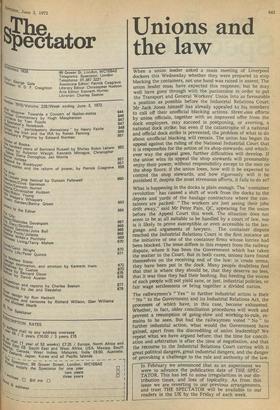Unions and the law
When a union leader asked a mass meeting of Liverpool dockers this Wednesday whether they were prepared to stop blacking the containers, not one hand was raised in assent. The union leader must have expected this response; but he may well have gone through with the pantomime in order to put the Transport and General Workers' Union into as favourable a position as possible before the Industrial Relations Court. Mr Jack Jones himself has already appealed to his members to call off their unofficial blacking actions. Stren.Aous efforts by union officials, together with an improved offer from the dock employers, may succeed in postponing, or averting, a national dock strike; but even if the catastrophe of a national and official dock strike is prevented, the problem of what to do about unofficial blacking will remain. The union has begun its appeal against the ruling of the National Industrial Court that it is responsible for the action of its shop-stewards; and whichever way the appeal goes, further difficulties will develop. If the union wins its appeal the shop stewards will presumably enjoy their power, without responsibility except to the men on the shop floors; if the union loses, how will it be expected to control the shop stewards, and how rigorously will it be punished if, despite the most strenuous efforts, it fails to do so?
What is happening in the docks is plain enough. The 'container revolution' has caused a shift of work from the docks to the depots and yards of the haulage contractors where the containers are packed:" The workers are just seeing their jobs drift away," said Mr Peter Pain, QC, appearing for the union before the Appeal Court this week. The situation does not seem to be at all suitable to be handled by a court of law, nor is it likely to prove susceptible or even accessible to the language and arguments of lawyers. The container dispute reached the Industrial Relations Court in the first instance on the initiative of one of the container firms whose lorries had been blacked. The issue differs in this respect from the railway dispute, where it has been the Government which has taken the matter to the Court. But in both cases, unions have found themselves on the receiving end of the law: in crude terms, they have been put in the dock. Many people doubtless feel that that is where they should be, that they deserve no less, that it was time they had their bashing. But heeding the voices of such people will not yield sane, or just, industrial polities, or fair wage settlements OT bring together a divided nation.
The railwaymen's " Yes " to further industrial action is their " No " to the Government and its Industrial Relations Act, the processes of which have, in this case, become exhausted. Whether, in fact, Older conciliation procedures will work and prevent a resumption of going-slow and wbrking-to-rule, reMains to be seen. But had the railwaymen voted " No " to further industrial action, what would the Government have gained, apart from the discrediting of union leadership? We repeat what we have argued before: that the time for conciliation and arbitration is after the time a negotiation, and that the recourse to the Industrial Relations Court carries with it great political dangers, great industrial dangers, and the danger of provoking a challenge to the rule and authority of the law.












































 Previous page
Previous page